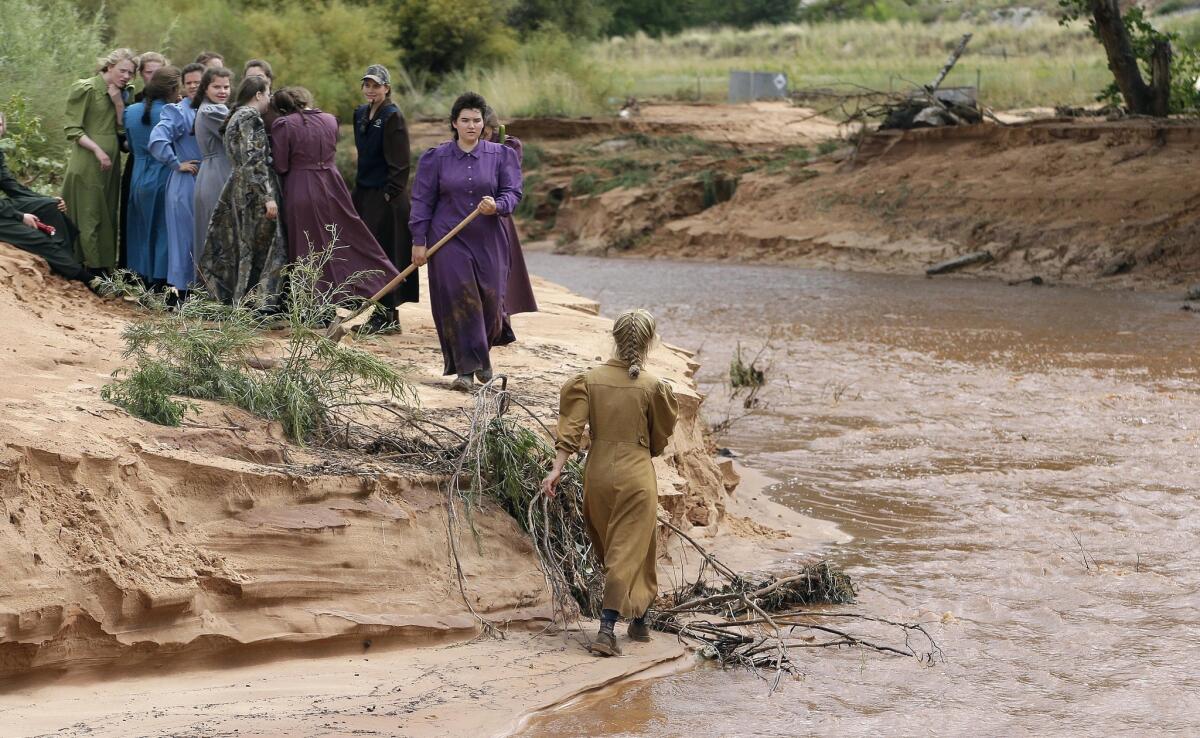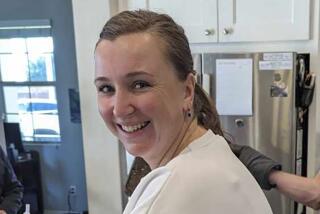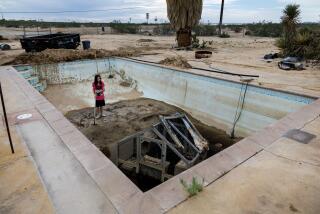Deadly flash flood tears the heart out of Utah and Arizona towns

People search along a stream after a flash flood in Colorado City, Ariz.
Reporting from Colorado City, Ariz. — Everyone knew the heavy, wet storms that settle over Mohave Canyon could turn the dry wash into a deadly river, but no one did anything to fix it.
Finally, when the surge hit, it was too late.
At least 12 people were killed Monday by a wave of water so powerful that it ripped their white SUV in half. Most of the dead, authorities said, were children. A search continued late Tuesday for a 13th victim, also a child.
Two families, related by blood and not yet identified by police, were ending a sunny afternoon at Isaac Carling Memorial Park when a storm settled over the nearby red cliffs that edge the Grand Canyon.
They stopped to watch the floodwaters stranding them on the Arizona side of the state line. Then, a roiling 4- to 6-foot surge of water rushed through the canyon, directly at the cars and the people inside.
From the road, a surface street that stretches over the river, it’s nearly impossible to see the height or speed of the water.
“In an instant, our families are gone,” said Joseph Jessup, a member of one family who delivered a brief statement to television cameras Tuesday while choking back tears. His young son, also named Joseph, stoically stood by his side.
Jessup and his family are part of a sect that broke with the Church of Jesus Christ of Latter-day Saints in part to continue the practice of polygamy. The sect, called the Fundamentalist Church of Jesus Christ of Latter-Day Saints, is distinguished by the women’s long, sleeved dresses and long braids. The sect is still reeling from the arrest of its leader, Warren Jeffs, in 2006.
Jeffs’ arrest and previous federal raids on polygamous compounds left the people here deeply suspicious of outsiders.
“We know God will heal our wounded heart,” Jessup said.
The canyon was hit by a “100-year flood,” Philip Barlow, mayor of Hildale, Utah, said Tuesday, as the region braced for a second, fiercer storm.
The church’s sister cities of Hildale and Colorado City were aware of the danger posed by the water raging through Mohave Canyon, Barlow said. In 1984, a wooden bridge was washed away, but Barlow said he had never seen a surge this large.
The cities had asked for money to build an all-weather crossing at the site of the flash flood, Barlow said — though he did not say whether the requests were made to federal agencies, county governments or church financial reserves.
“We were well aware of the issue,” Barlow said. “We had been anxious for years.”
The flooding also contributed to deaths in the towering red cliffs that surround the towns. In Zion National Park, at least three visitors exploring Keyhole Canyon were killed when more than half an inch of rain fell in less than an hour, park spokeswoman Aly Baltrus said. Four remain missing.
National Parks crews were working late Tuesday to recover two of the visitors’ bodies.
Religion is as strong here as fear of outsiders, but the secular residents and church members banded together to help dig through the remains of the smashed bridge and look for the last missing child.
“It’s something you don’t see very often,” said Christopher Wyler, 38, who said he was shunned when he and his wife left the sect four years ago. “It’s interesting how tragedies like this will pull us together.”
Jim Begert, owner of a transportation company in Colorado City, puffed the last of a cigarette before squishing it beneath his boot in a steady downpour.
“When it gets in that gap,” said Begert, pointing to a space between two towering cliffs west of the towns, “it’ll sit there, pouring water into the canyon. Then it hits.”
Begert and his wife are not members of the sect, but he gladly accepted a contract from the Washington County, Utah, Sheriff’s Office to haul vehicles out of the flooding, meaning he helped mostly church members.
About 650 searchers scoured Short Creek and its banks in a search that reached as far as 6 miles from the site of the flooding.
Utah Gov. Gary R. Herbert, who was on a trade mission in China, said in a statement he was “heartbroken” by the deaths. The Republican governor offered state resources to help rescuers pick through the tons of debris that have clogged Short Creek and that may contain more bodies or even survivors.
“This is one of the worst weather-related disasters in the history of the state of Utah,” Lt. Gov. Spencer J. Cox said at a news conference, announcing that the governor had activated the state National Guard to help with the search-and-recovery efforts.
Late Tuesday afternoon, three National Guard Humvees rumbled east on Route 59, toward Colorado City and more flooding.
“Our hearts and prayers go out to the families of those who have lost loved ones at this time,” Cox said. “We’re here to serve you. I hope this will bring the state and these communities closer together.”
Twitter: @nigelduara
Twitter: @mattdpearce
ALSO:
37 face charges in fraternity death blamed on ‘brutal’ hazing ritual
Houston mother, handcuffed in front of her kids at doctor’s office, faces deportation
Freeway crashes, water rescues and power outages as rain drenches parts of Southern California
More to Read
Sign up for Essential California
The most important California stories and recommendations in your inbox every morning.
You may occasionally receive promotional content from the Los Angeles Times.











